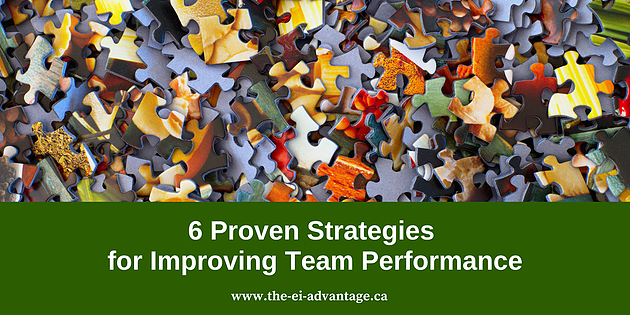Blog
6 Proven Strategies for Improving Team Performance
May 15, 2018

Team performance is a key factor in overall organizational success. But for many leaders, cultivating a high-performing and effective team can be quite a daunting task. How can you get people with varying attitudes, professional habits, and personalities to work cohesively as an efficient unit?
Emotional Intelligence, also known as EI, of yourself and each member of your team can greatly affect the overall performance of your department. Whether you’re introducing new processes to streamline your team’s workflow or simply want to enhance your team’s performance and culture, the following six strategies can help you increase your EQ and engage your team members to push their boundaries and reach their professional goals together.
How Does Emotional Intelligence Affect Team Performance?
Not only does EI affect your personal wellbeing and relationships, but it can have major implications on your leadership skills and professional environment, as well. Because EI helps guide you through your own emotions and those of others, best-in-class leaders with high EI know that they can use it to create a more effective team culture.
1. Never Make Assumptions About Your Team Members
Our perceptions of others are quite often tied to our emotions, so it’s vital that leaders maintain an open mind when dealing with challenges or disagreements between team members. Misperceptions can lead to misunderstandings and miscommunication, so make sure that you allow each team member to express their own feelings and emotions when navigating conflicts.
2. Dedicate Time to Have Healthy Team Discussions
Often, workplace tensions can build up over time and affect overall team performance. However, when team members are given dedicated time to bring up frustrations and discuss new ideas on how to move forward, all members can feel heard, understood, and more motivated to help each other.
3. Strive for Understanding
An understanding of how each individual team member can produce their best results is key to maintaining high team performance. As a leader, it’s up to you to set the example of practicing active listening with others and taking the time to learn the professional preferences of your team members.
4. Cultivate a Positive Professional Environment
Your team’s work environment is vital to its overall success, as individuals spend the majority of their working hours interacting with each other. As a future-forward leader, it’s your responsibility to keep your work environment upbeat and positive, encouraging others to work with respect and good intentions.
5. Encourage Rest
In a professional environment, it can sometimes feel as though everyone has to be turned “on” all the time. But those with high EI realize that they need to take breaks to gather their thoughts and get away from the screen every once in awhile. If there are busy days that require everyone’s attention to get the job done, take active pauses by going for a walk to discuss next-steps or review strategies. By encouraging your team members to take regular breaks, you’ll inevitably improve team performance.
6. Be a Problem-Solver
In even the most successful teams, challenges and interpersonal obstacles can hinder team performance. When this happens, make sure that you work to solve these problems rather than elevate them. Actively listen to all parties involved, and work to move the situation in a positive direction to eliminate potential roadblocks.
Improving team performance helps your employees be and do better in their professional lives. With an understanding of EI and how you can generate positive change for your team, you can create a cohesive unit and become a thought leader in your organization.
At EI Advantage, we use the Change Style Indicator® (CSI) to help team members understand how others approach change, how they deal with change on a personal level, and how your team can navigate challenges together. Want to learn more about how our Change Leadership services can help you improve your team’s overall performance? Contact us today or reach out on Facebook, LinkedIn, or Twitter.
